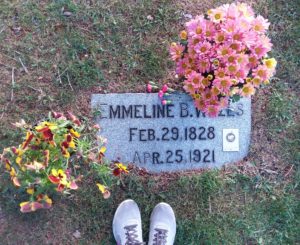The Power of a Name
by Emmalyn Pykles, Better Days 2020 intern

All my life I have carried, and I will carry, the names of two strong women: Emmalyn, after Emmeline B. Wells, and my middle name, Aline, after my great-grandmother. I say “carry” for a reason, because the weight of these women’s lives upon my own is something I have always felt. Perhaps that is because my parents made sure to teach me about these women and their lives- they have always had a passion and appreciation for history and therefore chose a name that was not only historically significant but one they hoped would be personally significant to me. But more than that–as silly as it sounds–I have always felt a personal connection to my namesakes. The inspirational resilience and goodness of these women is a quiet strength that I know I can always call upon within myself.
Both Emmeline B. Wells and Aline Rawson Pettit were intelligent, gifted, and powerful contributors to their communities. They were champions of women and advocates for the individual. Emmeline served as the general Relief Society president of the Church of Jesus Christ of Latter-day Saints from 1910 until her death in 1921. She was also the editor of the Woman’s Exponent and a friend and fellow suffragist of Susan B. Anthony’s.

Aline Rawson Pettit, courtesy of Emmalyn Pykles.
Aline was also an advocate for women and was a member of the LDS Primary and Relief Society General Boards in her time. She was the first woman to wear pants on her town’s main street. My mother, speaking of Aline, has always told me that she believed she could have had the fame of the world if she wanted it. Yet instead, my great-grandmother chose to influence her community in a quieter, but more meaningful way through a lifetime of service and courage.
Despite the 100 years that separated their lives, these two women both experienced struggle in their society because of their gender. Yet, both Emmeline and Aline embraced their title as women and all that it meant. They gave it a new meaning that would leave a legacy great enough that my parents would think of naming their daughter after them. Having the honor of carrying their names not only reminds me to live up to that legacy, but also reminds me of the potential others first saw in me and of the potential I still have. I now know that what my parents really wanted me to know through my name is that the impressive Emmeline and Aline were once just little girls too–it is what they chose to do with their lives that distinguished them.
When I learned of Better Days’ work regarding the memorializing of Utah women such as Emmeline B. Wells AND my great-grandmother Aline, I immediately felt a connection with it. Never before had I known someone besides my own family who was familiar with Emmeline’s work or life; yet here was this energetic and fresh organization that focused many of its efforts on my namesake. After learning about their work to make Dr. Martha Hughes Cannon one of Utah’s statues in the U.S. Capitol, I knew that this movement was something I wanted to be a part of–they were making revolutionary stuff happen and creating a new culture right here in my own backyard.
From the Better Days movement I feel the same power I feel when I think about my namesakes. The energy and resonance of a group of people motivated by a passion for something better is a feeling like no other. What Emmeline, Aline, and the people behind BetterDays 2020 all share is a drive that motivates them to make the world better-their choice to do something about what they felt could be better has made all the difference.

Emmeline B. Wells gravesite in Salt Lake City cemetery. Courtesy of Emmalyn Pykles.
Since starting my internship time with Better Days, I’ve seen the power of sharing the message of Better Days 2020 with others as I’ve explained to them what the organization is all about. This spring I had the opportunity to attend a scholarship conference in Washington D.C. with two students from every state across the nation. I was surrounded by the widest, most diverse group imaginable, but one thing became really clear to me. The dialogue regarding women in Utah is different from any other state’s. We’re behind the curve in this aspect, but as Better Days has proven, not in an insurmountable way. To me, each card, view, license plate, like, and dollar that Better Days receives represents a seed planted in the lives of Utahns as, one by one, we come to see the importance of recognizing our history and the importance of reinstating a pattern of civically-involved women. We used to be at the front, blazing the trail. We can look to our metaphorical “namesakes” and find the potential to regain that position within ourselves. I know that we will be telling the next generation about the work of Better Days in their history classes, but it will take each of our everyday efforts to continue to achieve progress.
I will forever be grateful for my parents’ sentimental tendencies that have given me such a significant name, and for the memory of the women my name, and hopefully my life, will perpetuate. Carrying their names is a privilege, and a constant reminder, of the type of woman I hope to become. Like my namesake Emmeline B. Wells once said, I echo: “I believe in women, especially thinking women.” If Emmeline, Aline, and the Better Days team have taught me anything, it is that the power of a “thinking woman” is unmatched.
Emmalyn is a graduating senior at Bountiful High School.

